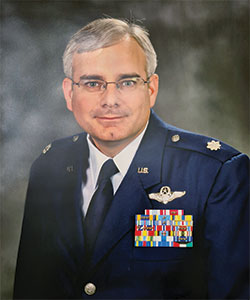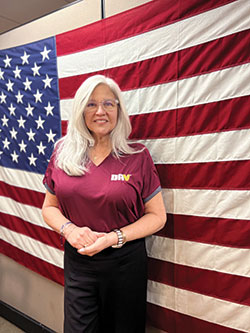
Steve Visco sat in a state of shock as his oncologist explained that his cancer had advanced and chemotherapy would be the next step. The retired Air Force colonel had grown suspicious because of symptoms like fatigue.
“I was feeling really tired, and I wasn’t eating; I had no appetite,” said Visco. “These are all classic examples of lymphoma, and I knew it had progressed.”
By the summer of 2023, he had lost nearly 20% of his body weight. Lymph nodes around his beltline, upper thighs and back were swollen, ranging from the size of a pea to larger than a walnut. Doctors biopsied the cancer and found that one-third of Visco’s lymph nodes in his upper back had transformed from follicular to diffuse large B-cell lymphoma, a potentially more aggressive and faster-growing subtype of non-Hodgkin lymphoma.
In consultation with his doctors, Visco agreed to chemotherapy.
He also filed for disability through the Department of Veterans Affairs in 2024 without assistance. When the claim for the cancer came back approved but at 0%, he was more than discouraged.
“I knew something was wrong. I just knew this was a mistake,” said Visco. “I was confident that if I got the right person, it would all be resolved.”

That right person was DAV benefits advocate Amanda Almaraz.
“As I was listening to what he was telling me about this type of lymphoma and the treatment that he underwent, [I realized] that it’s basically considered still active,” said Almaraz.
Visco was first diagnosed with lymphoma four years earlier, after he found a lump on his neck that surgeons then removed and biopsied.
The follicular lymphoma was indolent, meaning it was progressing gradually and might not cause symptoms. In many cases, it’s considered an uncurable chronic disease, according to the American Cancer Society. So Visco’s doctors initially adopted a “wait and watch” strategy rather than jumping straight into other treatments.
Visco has no family history of cancer in any part of his immediate or extended family. However, one oncologist wrote in a medical note that the cause may be environmental and noted his 27 years of service in the Air Force.
Lymphoma of any type is a presumptive condition under the PACT Act. The DAV-championed legislation was the largest expansion of veterans benefits for toxic exposures in history, unlocking VA disability and health care for Vietnam War, Gulf War and post-9/11 veterans who served in qualifying countries. In Visco’s case, he deployed to Saudi Arabia during the lead up to the Gulf War and in subsequent years.
As a staff officer responsible for planning during Operation Desert Shield, Visco’s first stint in Saudi Arabia was just outside the capital city of Riyadh. But when he returned three more times, Visco found himself 60 miles away in the middle of the desert.
“We were staying in tents, and burn pits were there,” Visco said.

American military burn pits were ubiquitous in many countries, including Saudi Arabia. They were efficient at reducing large amounts of waste, but they were also found to cause varying diseases and cancers, including lymphoma. Burn pits were used to dispose of everything from extra equipment to computer hard drives, tires, tents and even human waste. What was less clear at that time was how the billowing black smoke would affect service members and veterans for years to come.
As burn pit exposure is a PACT Act presumptive, the VA must, by law, conclude that Visco’s cancer stemmed from his service. And according to federal regulations, a 100% rating should be granted for non-Hodgkin lymphomas when there is an active disease in treatment or with an indolent phase.
When Visco contacted DAV after receiving his disappointing news, Almaraz, the national service office supervisor in Washington, D.C., knew she could help. She unearthed an error in which the compensation and pension examiner neglected to check a box next to the word “indolent.”
Realizing a clear and unmistakable error, Almaraz contacted her counterparts at the VA to rectify the inaccuracy. After speaking with VA officials, they granted Visco the proper rating within hours.
“It’s obvious that DAV has the knowledge and the resources and contacts to make things happen,” said Visco. “I’m very grateful to DAV. I’m very grateful to Amanda. I’m just very grateful.”
“When DAV and VA work together, we can make great results for our veterans,” added Almaraz.



